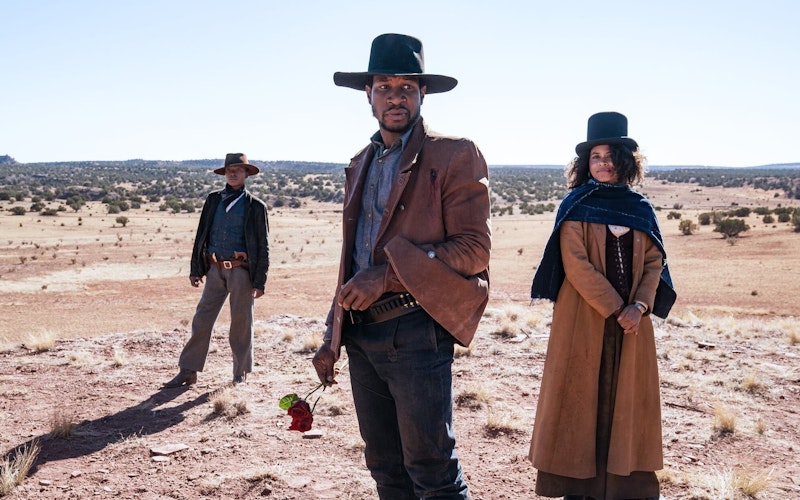
Movies
The False Love of The Harder They Fall
Spoiler warning: Love conquers all.
Ever since Nat Love was a child, when a man killed his parents and carved a cross into his forehead, he’s been on a quest for vengeance. Unfortunately, that means he has to go against a ruthless band of outlaws led by the infamous Rufus Buck—the very man who murdered his parents in front of him.
It’s a classic setup for a Western. And make no mistake, in The Harder They Fall, new to Netflix, justice will indeed be served. What’s not so typical in the movie, however, is that the gangs of Rufus Buck and Nat Love highlight a cast of nearly all Black actors (playing characters loosely based on real figures).
And what a cast it is. The Harder They Fall bursts with thrilling performances, even if the script is too reliant on witticisms and wry threats. Idris Elba (as Buck), Zazie Beetz (as Love’s romantic interest, Stagecoach Mary), Regina King, LaKeith Stanfield, and Delroy Lindo all give characteristically captivating turns. Relative newcomer Danielle Deadwyler is particularly strong as Mary’s assistant and saloon bouncer Cuffee, a small but capable woman in a world of aggressive men.
But the greatest of these is Love. Despite the gravitas and energy found in every direction, Jonathan Majors still stands out as a highlight. Majors (The Last Black Man in San Francisco, Da 5 Bloods, HBO’s Lovecraft Country) smirks and swaggers as befits his role, but he also compellingly expresses the uncertainty and distress Love also feels. Even with this starring turn, I think the world is still catching up to just how good Majors is.
The movie’s strengths go beyond just its cast, as director Jeymes Samuel employs the tropes of the Western canon with equal parts style and subversion. Cowboys whistle as they wander through town. Slow glares precede a burst of gunfire. Trains are robbed. And the sheriff carries out his duty with some measure of reluctance. Samuel crafts enough innovative camerawork and set-piece staging to infuse these trademarks with verve. However, the movie also carries much of the genre’s baggage, which creates a difficult conflict—perhaps especially for Christians.
The Harder They Fall is rife with Christian symbolism: it opens with a prayer; Love’s first onscreen kill takes place in a church; and the cruciform scar in his forehead is a frequent image. But all of this is only a mirage of spiritual substance. The most glaring contradiction is Love himself. Love is not truly an agent of love; he’s an agent of vengeance, the kind of good violence we are told is needed to balance out the actual, evil violence of Rufus Buck’s gang. His name, his sense of righteous anger, and his Robin Hood moral code all point toward a good-hearted man doing good works. Yet Love’s deeds aren’t drastically different from Rufus Buck’s. They’re just aimed in a different direction.
The movie carries much of the Western genre’s baggage, which creates a difficult conflict.
Like many Westerns before it, The Harder They Fall ultimately presents a false dichotomy: bad violence versus good violence. It’s a limiting juxtaposition because of the paths it closes off. There’s no room for mercy or grace. There’s no true, biblical love to be found, the kind we discover in 1 Corinthians 13: “ Love is patient, love is kind. It does not envy, it does not boast, it is not proud. It does not dishonor others, it is not self-seeking, it is not easily angered, it keeps no record of wrongs.”
In The Harder They Fall, Love is not kind but violent. Love keeps a record of wrongs. Love is ultimately self-seeking, as the flourishing of others is subordinated beneath the needs of revenge. The movie is greatly interested in the sins of the father dripping down to the next few generations, but it altogether ignores the love that abundantly flows through a thousand to come.
The man seeking just revenge is an archetype in Westerns. The title character in The Outlaw Josey Wales is driven by limitless anger at the death of his family. Mortimer is out to avenge his assaulted sister in For a Few Dollars More. To be sure, Westerns can offer more than mere violence. Some give us an image of moral courage in the face of hopelessness (High Noon). Others show a defense of the defenseless (The Magnificent Seven). But far too often, justice is delivered with the pull of a trigger, leaving us with a choice between good violence and bad violence. When these present themselves as the only options, where is real love to be found?
The Harder They Fall is a striking, shining example of a modern Western. But in the end, the film can’t breathe new life into the suffocated solutions that many Westerns offer. Violence begets violence, and justice is delivered through means of metal and powder.
Conversely, in 1 Corinthians, Paul gives a remarkable picture of love as patient, kind, humble, generous, hoping, trusting, and persevering. And in John 15, addressing his followers, Jesus commands, “Love each other as I have loved you. Greater love has no one than this: to lay down one’s life for one’s friends.” This is not merely an exhortation, but also a promise of Jesus’ redemptive love, that he would lay down his life to make even those who were his enemies into his people.
Here, in Christ, we find a better way—a way that does not return violence with violence, but where love dies for the sins of the world. A way that pours out forgiveness and mercy. A way that might just turn our six shooters to plowshares. This way—in the life, death, resurrection, and ascension of Jesus Christ—is the way of real love and real hope, and in this we can rejoice. For it is his love that endures forever.
Topics: Movies